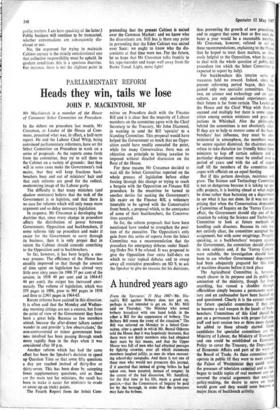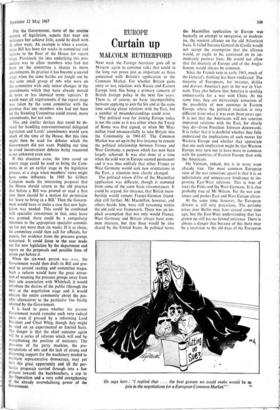A hundred years ago
From the 'Spectator,' II May 1867—Mr. Dis- raeli's. Bill against Bribery does not get on, perhaps is not intended to get on. As Mr. Mill said on Thursday, "the Minister who sowed bribery broadcast with one hand holds in the other a Bill for the suppression of bribery. The Bribery Bill meets the irony of the situation." The Bill was referred on Monday to a Select Com- mittee, after a speech in which Mr. Bernal Osborne told the House that it was hopelessly insincere, that there were not thirty members who had obtained their seats by fair means, and that the Upper House was full of men who had obtained peerages by fighting counties, over all which statements members laughed jollily, as men do when recount- ing school-day escapades. And there is not one of these men who would not prosecute this journal, if it asserted that instead of giving bribes he had taken one, been tempted, instead of tempter. In the course of the bad discussion, Mr. Sandford, for the first time in his life, made a good sug- gestion,—that the Commission of Inquiry be paid for by the borough, in order that the ratepayers may hate the bribees. For the Government, more of the routine aspects of legislation, aspects that wear out ministers but achieve little, could be dealt with in other ways. An example is when a conten- tious Bill has been for weeks in committee and returns to the floor of the House for report stage. Previously the idea underlying this pro- cedure was to allow members who had not been on the committee a chance to move amendments. In practice it has become a second stage when the same battles are fought out by the' same small group of MPS who were on the committee with only minor changes in the amendments which they have already moved in more or less identical terms 'upstairs.' It would meet all requirements if the report stage was taken by the same committee with the promise that any members who had not been on the Standing Committee could attend, move amendments, but not vote.
This and similar devices that could be de- vised for handling non-controversial delegated legislation and Lords' amendments would save much of the time of the House. But this time might then be used for debates which the Government did not want. Padding out time to avoid inconvenient debates being requested is not unknown even now.
If this situation arose, the time saved on report stage could be used to bring the Com- mons in at an earlier stage in the legislative process, at a stage when members' views might have some influence. In 1945 Sir Gilbert Campion made the interesting proposal that the House should return to the old practice that before a Bill was printed or read a first time there should be a motion for permission for 'leave to bring in a Bill.' Then the Govern- ment would have to make a case that new legis- lation was needed. This could be combined with specialist committees in that, once leave was granted, there could be a compulsory reference to the appropriate specialist commit- tee for not more than six weeks. If it so chose, the committee could then call for officials, for papers, for evidence from the pressure groups concerned. It could listen to the case made out for new legislation by the department and report on the proposals and possible lines of action put-before it.
When the six-week period was over. the Government would then draft its Bill and pro- ceed to second reading and committee stages. Such a reform would have the great attrac- tion of weaning the pressure groups away from their sole association with Whitehall, it would introduce the desires of the public (through the MPs) at the negotiation stage and it would educate the entire community about the pos- sible alternatives to the particular line finally adopted by the Government.
It is hard to guess whether the present Government would consider such very radical ideas even if pressed by a reforming Lord President and Chief Whip, though they might be tried on an experimental or limited basis. The danger is that the chief outcome again will be a series of reforms which will end by strengthening the position of ministers. The Pressures of the party machine, the pre- occupations of Mrs and the lack of strong and discerning support for the machinery needed to maintain representative democracy, may yet turn this great opportunity and all the par- ticular proposals carried through into a few gestures towards the backbenchers, a sop to the Opposition and a very solid strengthening of the already overwhelming power of the Government.































 Previous page
Previous page